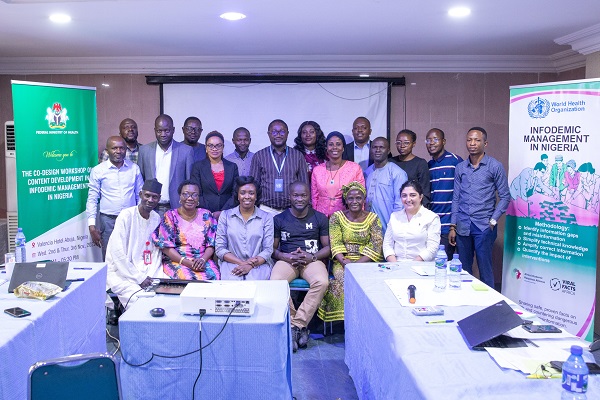
The Federal Ministry of Health (FMOH), in collaboration with the World Health Organisation (WHO) and the Africa Infodemic Response Alliance (AIRA), has trained Nigerian journalists and health professionals on content development in infodemic management.
In his remarks during the closing ceremony of the training in Abuja over the weekend, the technical officer, infodemic management, WHO, Dr. Abdulrahman Danjuma said the training was part of WHO’s support for the Nigerian government on health security.
Danjuma said that the training was to ensure that the infodemic management system was established at the national and sub-national levels and, in doing so, identify key stakeholders.
He said that the training was to train stakeholders in the country on co-designing content for infodemic management which would also entail human-centred designs, design thinking and other forms of innovative approaches in content development.
“Infodemic management is a process. We need to gather risks and evidence to mitigate health risks which lead to favourable behavioural changes.”
He said every disease outbreak comes with narratives which affect people and make them lose trust in government intervention, science and health.
“When you are trying to communicate to your audience, the plan is to ensure that you know the kinds of content that would be appreciable and informative to them. There are different kinds of content for different kinds of audiences,” he stressed.
Danjuma stated that an infodemic misleads people into making inappropriate decisions that affect their health-seeking behaviour. Thus, he stressed the need for proper infodemic management to keep them informed.
In her remarks, the acting head, health promotion division, FMOH, Mrs. Deborah Jokodola, said the essence of the training was to build the capacity of the participants on how to curate content suitable for diverse audiences. “Without content, there’s no information,” she stressed.
According to Jokodola, there’s already misinformation and disinformation but content lets people understand what infodemic is all about, their information sources and [degree of] credibility.
“[They need to know] where they can get it so that they will not be misled, get misinformed and take rash health decisions; instead of having good health.”
She urged participants to deploy the knowledge and skill acquired in the training to produce content on health misinformation and disinformation and pass the knowledge around to their audiences.
Also speaking, Snr. health correspondent, News Agency of Nigeria (NAN), Ms. Racheal Abujah said that as part of efforts to strengthen infodemic management systems in the country, the agency has been supporting the country’s infodemic management team to review weekly trends.
Abujah said that the efforts have helped to focus the media’s support for tackling health misinformation and disinformation and building resilience against misinformation of the populace.
According to her, during the peak of the COVID-19 pandemic journalists placed themselves in a responsible but vulnerable position within the communication ecology, not solely as a result of the pandemic but due to environmental conditions that long preceded it.
She said that journalists found reporting difficult during the pandemic and sought to mitigate the forces challenging their work, to reverse the flow of misinformation and disinformation.
Abujah said that the infodemic management team in the country leveraged the pivotal role of freedom of expression and access to information to address information needed during outbreaks.
NAN reports that WHO defined an ‘infodemic’ as ‘too much information, including false or misleading information, in digital and physical environments during a disease outbreak’.
The training was funded by Gates Foundation and aimed to build the capacity of stakeholders in content development for infodemic management in Nigeria, using the co-design approach, human-centred design, design thinking and other innovative approaches.
During the training, participants were partitioned into groups and they were mentored on how to map audience segments, define and designing of personas, content focus groups and content ideation sprint.
At the end of the training, each group came up with content proposals on infodemic management for various audiences in the country.

